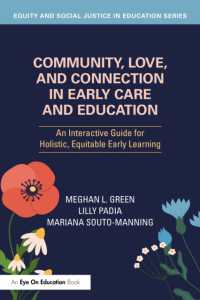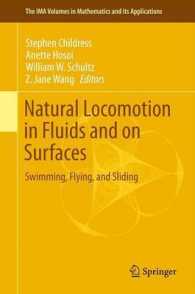- ホーム
- > 洋書
- > 英文書
- > Politics / International Relations
Full Description
This book is available as open access through the Bloomsbury Open Access programme and is available on www.bloomsburycollections.com.
Despite South Africa's successful transition to democracy and lauded constitution, political freedom for the majority of South Africans remains elusive. The poor and unemployed majority are poorly represented and lack power and thus freedom. Under these conditions, the freedom of the privileged minority is also seriously impaired due to the costs of maintaining their relative security and well-being. Lawrence Hamilton is an internationally-known political theorist, who has spent ten years teaching in South African universities. In this unique book he brings ideas - political and philosophical - to the fore to understand a contemporary political conundrum. He outlines the persistent, unresolved problems characterizing contemporary South Africa: poverty and quality of life statistics that are appalling for a middle-income country, levels of inequality that make South Africa one of the most unequal places in the world, skewed economic and political representation that reproduces elites rather than generating opportunities for all and an electoral system that implements the idea of proportional representation so literally that it undermines meaningful representation. Are South Africans Free? aims not only to explain the current state of South Africa but to provide positive new directions and suggestions for institutional change. Hamilton argues that freedom as power in South Africa does not depend on good will, charity or duty, and it goes beyond the complete realization of the political and civil liberties currently safeguarded in its constitution. Such change will depend on courageous leadership, active citizenship, new forms of representation and a macroeconomic policy that offers radical redistribution of actual and potential wealth.
Contents
IntroductionChapter 1: Political Freedom?Chapter 2: Poverty, Inequality and EducationChapter 3: Political Representation or What's Wrong with South Africa's Electoral System?Chapter 4: Public Debt and the Economic Credibility of the Post-Apartheid StateChapter 5: What is to be Done? Overcoming South Africa's Lack of FreedomConclusionBibliographyIndex








